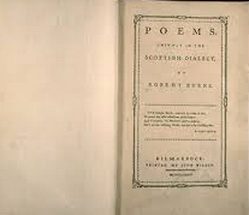Born in Kilmarnock, John Wilson, along with his brother Peter, founded the earliest Ayrshire newspaper, the Ayr Advertiser. They also operated as printers and publishers specialising in editions of the classics. Wilson published the poems of Burns’ friend John Lapraik, but it was the first edition of Burns’s Poems Chiefly in the Scottish Dialect, published from his press thought to have been in Star Inn Close (now demolished), which brought him fame.
It’s not known how Burns got in touch with Wilson, though doubtless the poet had many Kilmarnock friends who would have introduced him to the printer. On 17th April 1786 there appeared:
“Proposals for Publishing by subscription, Scottish Poems by Robert Burns.
The work to be elegantly printed, in one volume, octavo. Price, stitched, three shillings. As the author has not the most distant mercenary view in publishing, as soon as so many subscribers appear as will defray the necessary expense, the work will be sent to the press.”
After a quotation from Ramsay, came the undertaking: “We, the undersubscribers, engage to take the above-mentioned work on the conditions specified.” The subscribers, who assured the success of the venture, were not so much the purchasers of single copies (the poet himself took three), but friends of Burns such as the Ayr attorney McWhinnie who took twenty copies; John Kennedy of Dumfries House, near Cumnock, took another twenty copies; John Logan of Knockshinnoch, took twenty, ‘Orator Bob’ Aitken, took a hundred and forty five subscriptions; Robert Muir of Kilmarnock, took seventy copies; Gavin Hamilton took forty copies and Gilbert, the poet’s brother who, like Wilson himself, disposed of seventy copies.

The actual work of printing began on 13th July 1786, and on 31st July, the edition of six hundred and twelve copies was ready for distribution. The book, costing 3/- (15 pence) per copy, sold far beyond the list of three hundred and fifty advance subscribers. By 28th August 1786, Wilson had only thirteen copies left. In October, the cautious Wilson offered to print a second edition of a thousand copies, but required Burns to pay about twenty-seven pounds for the paper and fifteen or sixteen pounds for the printing, which he was unable to do. Wilson’s timidity thus, in a sense, drove Burns from a local business to a national publisher for his next publication…….. The Edinburgh Edition.
So far as can be ascertained, the receipts amounted to £90 or thereabouts. Wilson’s note of the cost of production brings the amount spent to thirty-five pounds seventeen shillings, which should have left Burns about fifty-four pounds. Burns, however, stated that the venture only brought in about twenty pounds.
Detailed below are the Songs and Poems of Burns’ “Kilmarnock Edition” listed in the Order they appeared in the original Edition.
–
Click on the appropriate link to access the full Text
–
The death and dying Words of Poor Maillie
To J. S**** [ Later referred to as “Epistle to James Smith” ]
The Cotter’s Saturday night, inscribed to R. A. Esq;
To a Mouse, on turning her up in her Nest, with the Plough, November 1785
Epistle to Davie, a brother Poet
The Lament – Occasioned by the unfortunate issue of a friend’s amour
Man was made to mourn, a Dirge
A Prayer in the prospect of Death
To a Mountain-Daisy, on turning one down, with a plough, in April 1786
On a Scotch Bard gone to the West Indies
A Dedication to G.H. Esq – [ Later referred to as “A Dedication to Gavin Hamilton, Esq.” ]
To a Louse, on seeing one on a Lady’s bonnet at Church
Epistle to John L*****k, an old Scotch Bard ………… [ Later referred to as “Epistle to J. Lapraik” ]
…….. to the Same – [ Later referred to as “Second Epistle to J. Lapraik” ]
……. to W.S*****n, Ochiltree………. [ Later referred to as “Epistle to William Simpson” ]
…… to J.R******, enclosing some Poems ……….. [ Later referred to as “Epistle to John Rankine” ]
It was on a Lammas night [ Later referred to as “The Rigs o’ Barley” ]
Song Composed in August [ Later known as “Now Westlin Winds and Slaught’ring Guns” ]
The Farewell – To the Brethren of St James’s Lodge, Tarbolton
